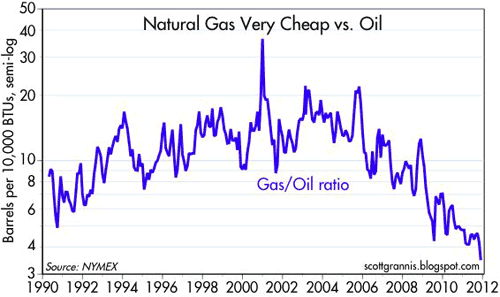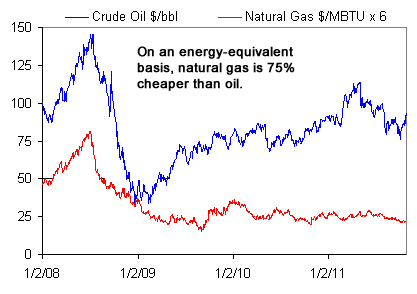

1. From Scott Grannis (top chart):
“Natural gas is down fully 75% from its 2008 high, while crude oil is down by only 33%. As the top chart above shows, natural gas hasn’t been this cheap relative to crude for decades, thanks to significant new drilling techniques which have resulted in a natural gas production bonanza in the U.S. It is hard to underestimate the degree to which cheap and abundant natural gas is going to transform U.S. manufacturing and energy generation in the years to come.”
2. From Nathan Slaughter (bottom chart):
And over the decades, we’ve grown accustomed to oil as one our chief energy sources. So accustomed, in fact, that we’re now overlooking a cleaner, plentiful alternative that is about 75% cheaper. The bottom graph above shows the price of crude oil versus the price of an equivalent amount of energy from natural gas during the past three years.
A barrel of oil contains about six times the raw energy content of a thousand cubic feet (Mcf) of natural gas. So all things being equal, with oil prices about $99 per barrel, natural gas should fetch about one-sixth as much, or $16.50 per Mcf. But thanks to horizontal drilling and fracking technologies, the United States is now awash in accessible, cleaner-burning natural-gas resources. And the resulting flood of natural gas has created a surplus, causing prices to collapse.
Natural gas isn’t just readily available at a 10% or 20% discount to oil — but more than 75%. These economics are simple but powerful. It’s hard to justify paying $1 for an energy source when you can buy something comparable for $0.25.”
- Bulenox: Get 45% to 91% OFF ... Use Discount Code: UNO
- Risk Our Money Not Yours | Get 50% to 90% OFF ... Use Discount Code: MMBVBKSM
Disclaimer: This page contains affiliate links. If you choose to make a purchase after clicking a link, we may receive a commission at no additional cost to you. Thank you for your support!



Leave a Reply